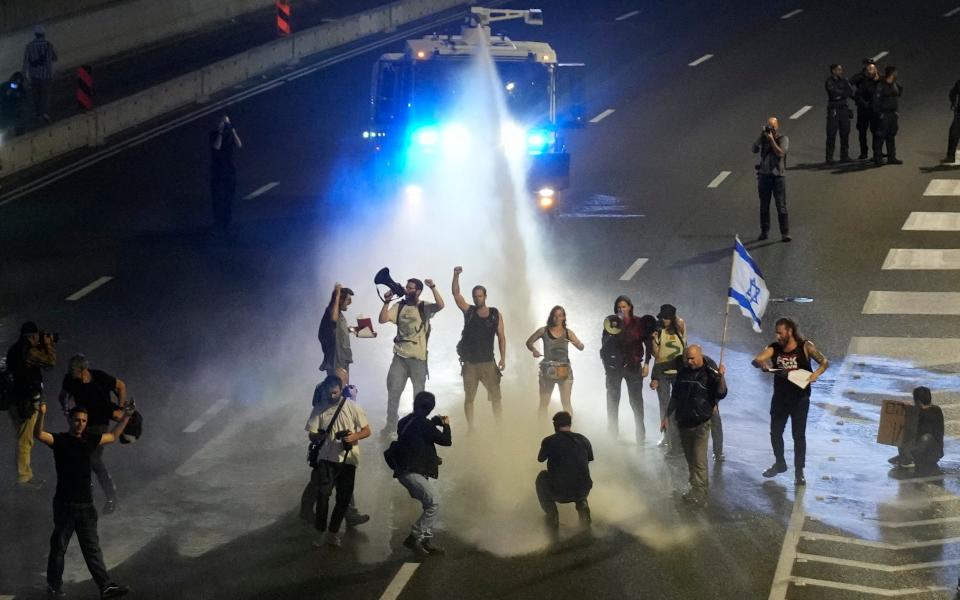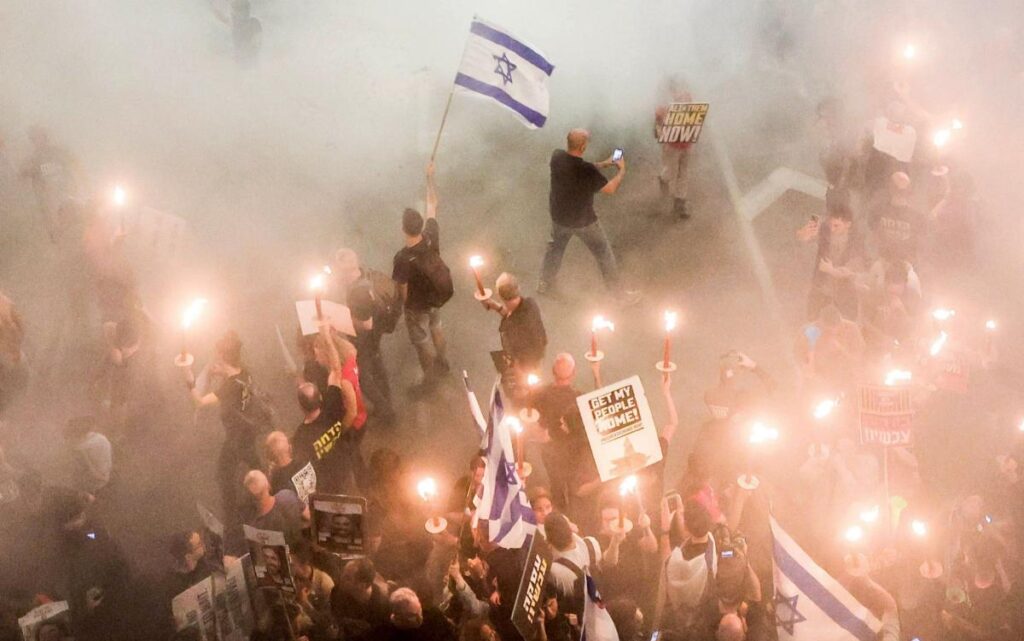In Israel, families of hostages fought together with pro-democracy demonstrators across the country, leading to the largest protest against the government since the outbreak of the Gaza War.
Families of the more than 130 hostages still held in Gaza have until now distanced themselves from anti-government protests that peaked last year against Prime Minister Benjamin Netanyahu's right-wing coalition.
But six months into the war and with no signs of a hostage deal, both groups rallied on Saturday night as tens of thousands of people took to the streets to call for elections.
Nadav Salzberger of the Change Generation movement, which is leading the Tel Aviv protests, told the Telegraph: The families of the 134 hostages have no hope of ever seeing their loved ones again, and the Israeli people are fed up with the most incompetent government in the country's history. ”
Salzberger added: “People understand that without public pressure, elections will not take place and a hostage deal is unlikely.”


Some 200,000 Israelis are still displaced from both northern and southern Israel after the October 7 Hamas invasion, in which 1,200 people, mostly civilians, were killed and another 250 More than 1,000 people were taken hostage in Gaza.
Israeli retaliatory attacks have since killed more than 30,000 Gazans in the Gaza Strip, according to the Hamas-controlled Health Ministry.
The number of protests was a fraction of last year's, amid a war that has left hundreds of Israeli soldiers dead.
But Israelis are cornered, said Dana Oren Yanai, deputy mayor of Herzliya, a suburb north of Tel Aviv.
There they saw four times the usual wartime number of about 2,000 people. Although this is still lower than the pre-war figure of around 20,000, it shows “how the wind is blowing,” she said.
She said: “Last year, when it was about democracy and it was a clear fight, it was much easier to go out and protest, but now people are feeling uncomfortable and it's hard to demonstrate during a war. feels inappropriate, but yesterday was the 176th day of war, mass kidnapping of Israelis, and [Mr] Prime Minister Netanyahu is not going anywhere, delaying time and refusing to make a deal. ”
Hamas is demanding a permanent cease-fire and the withdrawal of troops from Gaza, as well as the release of hundreds of prisoners held in Israeli prisons in exchange for 40 hostages, but Netanyahu's government is refusing to clear Gaza. He refuses to accept this agreement as he continues his mission. He rescues the terrorist group and rescues all remaining hostages.
Even though there are still more than 130 prisoners in Gaza, parliament is preparing to go into recess this weekend, infuriating the public.
“You seem heartless.”
Ms. Oren Yanai said: [parliament] People are shocked by the fact that all the Knesset wants is to take a vacation while people are being raped, tortured and murdered in the Gaza Strip.
“It seems heartless and this kind of behavior is incomprehensible to people's hearts, so the level of public anger continues to rise and we see more and more people demonstrating in more and more places across the country. It was done.”
Herzliya is an important indicator of the national mood. Residents of the wealthy, moderate city have been reluctant to protest, risking clashes like those seen in Tel Aviv, where the country's main highways were blocked and 16 people were arrested. Not too enthusiastic.
“When you see the number of demonstrators quadrupling, that means something. It means that Israeli anger and frustration has reached a certain level,” Oren Yanai said. Told. It shows how the wind is blowing. ”


On Sunday, Israeli and Hamas teams met with Egyptian mediators in Cairo to discuss a possible hostage deal. Officials told the Telegraph they were hopeful Egypt might be more successful than Qatar.
Qatar hosts Hamas in Doha and has no formal diplomatic relations with Israel, but a person with direct knowledge of negotiations to release Israeli hostages said, “The dramatic breakdown in negotiations reflects Qatar's helplessness and powerlessness.'' “It was caused by,” he said. Its interests are completely aligned with those of Hamas. ”
The official added: “The fact that Hamas leaders feel very at home in Doha and continue to live comfortably without fear of being deported or having their bank accounts frozen is clear evidence of this.'' '', he added.
“Qatar has a real ability to motivate Hamas to an agreement, but time is running out as no hostages have been released since November,” they said, adding that only one of the remaining hostages is alive. Only 40 people are believed to be doing so.
“Negotiators now understand that choosing Qatar as mediator was a mistake. Egypt would have been the wiser choice. Unlike the Qataris, the Egyptians disagree with Hamas's worldview. Not shared.
“There is no doubt that if Egypt had been a mediator from the beginning, great results would have been achieved on the ground by now.”


Broaden your horizons with award-winning British journalism. Try The Telegraph for free for 3 months. Get unlimited access to award-winning websites, exclusive apps, savings and more.


